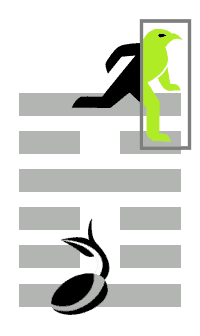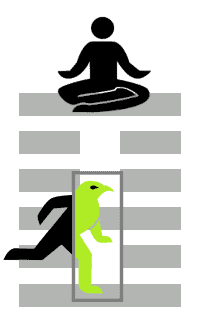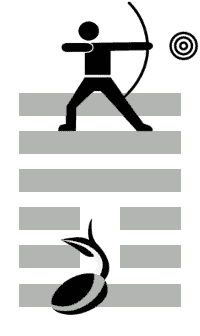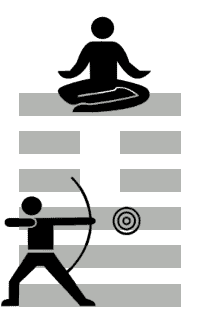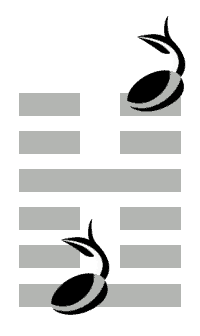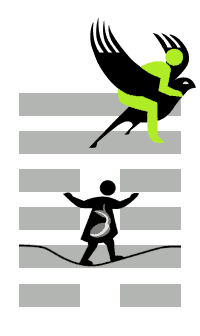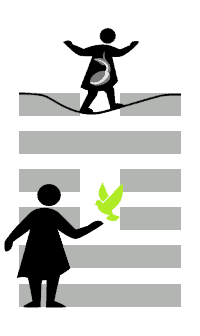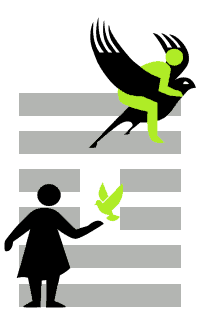Something new is coming to light decisively and powerfully. It will transform the entire situation. However, this new beginning has a price: we must disengage and let go of what is outdated, obsolete, an old pattern – even if it is hard to abandon something that was trusted and familiar for such a long time now. Eventually this image helps: a tree discarding old foliage, getting ready for a new cycle of life, with the old foliage serving as a fertilizer for new growth. We also need this fertilizer which is generated by disengagement: for our own forward bursting growth, which soon will interweave with the world, resonating with it in giving and taking.
Weiterlesen: 17 – followingTag: Zhen → Gen
18 – work on what has been spoiled
Is something wrong here? And if so: what is it? A dynamic development ends unexpectedly with a reality check – why? Momentum is basically positive. It turns unpleasant if the autopilot takes control. Autopilot occurs when a situation’s dynamic no longer comes from our own interior, but is determined by external (eventually cultural) imprint. A reality check is quite beneficial: Do I really enjoy what is currently happening? Does it make sense? Does it corresponds to my very heart – or is it a copy of someone else’s life? The answers to these questions will lead to a decision. And probably you must let go of something: maybe the autopilot, which was in control until now?
Weiterlesen: 18 – work on what has been spoiled21 – biting through
Usually, when we take a decision and want to make a change, we assume that we have to act in a completely new way, to add something unprecedented to the already existing.
Sometimes, however, the solution lies in just the opposite: to do nothing – and to let go of something. Maybe of our self-image, a habit, our accustomed view on something, our habitual “but we always…”. Perhaps it is also our impulse to bang with our fist on the table and to push our will through.
Weiterlesen: 21 – biting through22 – grace
Sometimes, our cool head is the savior: when chaos ensues, when gut feelings go haywire. But perhaps they are not going haywire at all; maybe we just don’t understand what they’re trying to tell us. That’s when the cool head comes to the rescue – guiding the gut, illuminating the darkness, calming the storm.
Weiterlesen: 22 – grace25 – innocence
無妄 wú wàng – A Japanese friend tells me about the meaning of the Chinese characters in the Chinese name of hexagram 25 – innocence. The first character means “scarifier tooth of the tiger”, the second means “release” or “letting go”. Later, a Chinese friend tells me that both characters are classical, so he cannot read them. This is not surprising: the Japanese adopted the classical Chinese characters and still use them today, while the Chinese have moved on to modern Chinese and therefore cannot read the old characters.
Weiterlesen: 25 – innocence26 – the taming power of the great
“I, I, all I!” – I am standing on the peak, I have achieved something. And now? I rest for a moment, enjoying the spectacular view. And then?
I reached the top. I have achieved something. I enjoy the view… What else do I see? More peaks. Summits which I could set off. And reenter the course of the world.
Weiterlesen: 26 – the taming power of the great29 – the abysmal
Hexagram 29 – the Abysmal is composed of the trigram Kan, the water, doubled. In many traditional I Ching commentaries this double water is read almost exclusively as a sign of imminent danger, fear, or collapse. Elsewhere I argue for a broader view, one that also acknowledges Kan‘s positive potential – and, by extension, the creative aspects of our own unconscious, with all its unruly currents. Kan does not refer unilaterally to threatening torrents or perilous depths: it can just as well be understood as a symbol of life-giving depth, hidden resources, intuitive adaptability, and the ability to overcome obstacles through creative fluidity.
Weiterlesen: 29 – the abysmal51 – arousing
Questions on Hexagram 51
- A user has recently been promoted within the company. But he does not feel comfortable with the new challenge: he des not feel taken seriously by his colleagues. His question to the I Ching: “How should I behave?”
- A user asks: “How can I get rid of my unconscious fears and adjustment tendencies and live a truly independent and unattached life?”
- A user has sent work overseas and asks what, if any, response he can expect. “Is anything going to happen now?”
- A user is in constant conflict with his partner, discussing issues that have not been right for a long time. There are no other conversations than that. He is faced with the question – and he asks it to the I Ching – whether the relationship is over.
The current interpretation can be found here: https://www.no2do.com/hexagramme_en/788788.htm
52 – keeping still
Case Study
A user consults the I Ching with the following concern: “How can I get to work independently in my profession?” She adds: “This year I attended a professional training course. Since then I have been playing with the idea of working independently, self-employed, to develop a new mainstay. I was really impressed by the speaker at the professional training. And anyway, for some time now I have felt like trying out some new methods and professional approaches.”
The I Ching responds with hexagram 52 – keeping still.
59 – dispersion
Case Study
A user asks the I Ching about her business constellation which has served her well for a long time. Recently, however, she felt that it was time for a change as she wanted to focus on a different target group in the future. The I Ching answers with hexagram 59 – dispersion. The title, dispersion, confuses her: does it mean that she should liquidate her old business and then to start all over again in a new constellation?
Weiterlesen: 59 – dispersion60 – limitation
Questions on Hexagram 60
- The user’s question is: “What is there to say about the city / area where I live?” The user has lived in this place for a long time, but always with a feeling of alienation, discomfort, like a prisoner. He feels grateful – but at the same time burdened, bored.
The answer of the I Ching is: 60 – limitation. Somehow he likes the modern interpretation Debris turns Humus. A similar phrase has been with him for a long time, a phrase that speaks of flowers that need a certain kind of soil/dung to grow. - The user’s question: “What is important now, in this existentially threatening situation?” The background, he explains, is that new projects are developing that give him justified hope. He feels that he should nurture hope and at the same time take the chaos (in the form of his living environment) more easily. There is a lot to sort out, and this mountain of work together with old fears almost paralyzes him. But at the same time he feels hope, a light that gives him courage and says: All is well.
- A user asks how he should behave in the upcoming collaboration. He actually feels superior to his partner because of his greater experience and would like to set the pace. On the other hand, it is clear that his partner will manage and coordinate the entire project.
- A user asks: “When will Max the dachshund return to his owner? Will he ever come back?”
- One user writes: “I’ve started a new job and find myself increasingly overwhelmed by the demands of the position. At first I thought that the project would open up to me as I got used to it, but now I find myself more exhausted and drained every day. My question to the I Ching is: ‘How can I resolve this situation? What should I do?'”
The current interpretation can be found here: https://www.no2do.com/hexagramme_en/778878.htm
61 – inner truth
Case Study
A user has the following concern: “Why does the question of the meaning of life keep popping into my head, even though it seems to make no sense and I just keep going around in circles?” The I Ching’s answer: hexagram 61 – Inner Truth.
Weiterlesen: 61 – inner truth


